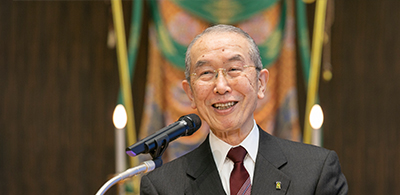Accepting Our Responsibilities Willingly
November 2014

Like Water Flowing Unhindered
Japanese people have long felt that choosing whether or not to serve on a PTA committee or in a neighborhood community association is a perfect example of difficult decision-making. This is because serving as a member means one has to keep in mind the opinions of others and expend a lot of energy in arranging one’s schedule, and sometimes one has to listen to criticism from parents or the public. So such service is considered to have certain drawbacks. Furthermore, if the position includes heavy responsibilities, one may not feel confident about taking it on. So we nod in understanding when we hear someone says, “I could never handle those duties.”
Founder Nikkyo Niwano once wrote, “In such a case, it may sound humble for one to say, ‘Sorry, but that is too great an honor for me.’ However, that is not an example of real humility. Someone with a truly humble heart and mind thinks, ‘Lord Buddha, I know that my limited abilities may not be sufficient, but please put them to good use. If you give me the strength, I will be able to stick to the task until it is finished.'”
The founder said this when he was describing his frame of mind after having been appointed as chairman of an important committee in the preparatory stage leading to the founding of the World Conference of Religions for Peace. Most likely, Founder Niwano would have felt the same way about his duty if he had been chosen to serve in a community association.
By accepting willingly whatever responsibility is asked of us, without giving a thought to whether it is large or small, heavy or light, we are able to remove another section of our ego, and enlarge the vessel of our hearts and minds.
The degree of influence we can exert on our lives by our own physical and mental powers is considered to be almost nil. Our lives are made up of connections to all things and change according to the conditions we encounter through dependent origination. Accordingly, even when we have determined our own choice about something, that choice is still an example of the functioning of causality and is part of the larger realm of the working of the Buddha.
Therefore, it is entirely natural that we accept willingly all encounters that we are blessed with in our lives, just as water flows without hindrance.
The Essence of the Buddha-Nature
On a few occasions, Shakyamuni had the opportunity of meeting an overwhelming army that was planning to invade the land of his birth, and spoke calmly about his thoughts of his homeland, hoping that the soldiers would change their minds. Finally, however, he accepted the harsh reality that was to occur.
If he had been an ordinary person, he could not have accepted the downfall of his homeland so calmly. Shakyamuni, however, had resigned himself to it, knowing it happened as a result of cause and effect. Shakyamuni’s ultimate ideal transcended temporary vicissitudes, but when faced with the misfortune of his homeland, it may well be understood that he, as a human being, came to know the extremes of anguish completely and thoroughly. Through this, the spirit of Shakyamuni reached the highest of the nine heavenly realms.
In Rissho Kosei-kai’s early years, when the organization was being harshly criticized by a national newspaper, Founder Niwano called the newspaper company “a bodhisattva,” and accepted the criticism as food for the heart and mind. Harsh realities and painful, tragic events are always difficult to accept. However, just as is written in the Lotus Sutra: “So is it also with the Dharma of the buddhas: they employ thousands of millions of skillful means to well teach the Dharma appropriately,” the Buddha expounds the teaching in a manner that is suitable to each situation.
Once we understand this then, for example, even when visited by suffering or shouldering some major responsibility, we can see it as an opportunity to learn and accept it with a positive attitude.
Still, at such times, if possible, I hope we can accept things cheerfully and willingly. We should open our hearts and minds to accept them just as easily as taking the lid off a jar and putting something inside. By doing so, our hearts and minds can become cheerful and enriched, while keeping the lid on only closes our hearts and minds. The willingness to do so, by always answering “yes,” is important in our daily lives. To be able to answer “yes” represents the essence of the buddha-nature that originally exists within ourselves. It transcends our small egos that are affected by trivial things.
Back Number


